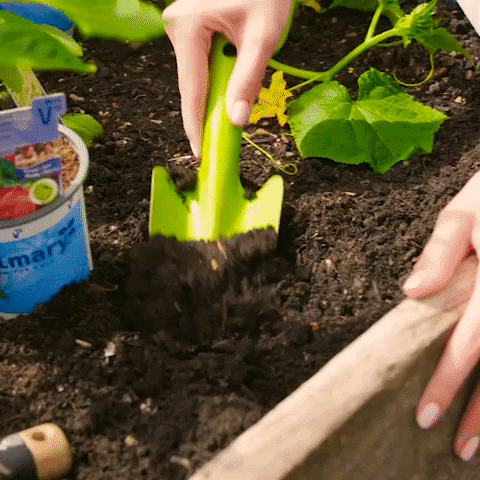Did it ever cross your mind that the seemingly mundane task of turning soil and sowing seeds might revolutionize your well-being?
The health benefits of gardening stretch far beyond the joy of watching your garden grow. Gardening isn't just about getting your hands dirty; it's an exhilarating workout, a natural way to soak up some vitamin D, and a perfect method to unwind and de-stress.
Activities in the garden can burn as many calories as gym workouts! Imagine lowering your blood pressure and increasing your vitamin D levels just by spending time caring for your plants under the sun. Sounds almost too good to be true, right?
With mental health awareness on the rise, finding solace in nature has never been more important. Reconnecting with our natural surroundings has many mental health benefits.
When you spend time outdoors you can remarkably soothe your senses, elevate your mood, diminish stress, and uplift your emotional state.
So let's step away from screens now and then, and embrace the health benefits of gardening.
Table Of Contents:
- Unearthing the Physical Health Benefits of Gardening
- The Psychological Perks of Gardening
- Fostering Connection in Community Gardens
- Harvesting Happiness: An Emotional Uplift from Gardening
- Gardening for the Soul: Spiritual Benefits
- From Seed to Table: The Nutritional Advantages of Home-Grown Produce
- Conclusion
Unearthing the Physical Health Benefits of Gardening
Gardening is more than just making your yard look good. It makes you look -- and feel -- good! Let’s dig into how getting down and dirty in the garden can boost your physical health.

The Heart-Healthy Aspects of Gardening
Ever wondered why gardening feels so satisfying? According to research, gardening blends physical activity with exposure to fresh air and sunlight.
Combining soil, sunshine, and sweat in the garden is akin to penning a heartfelt ode to your well-being.
The effort you put into digging, weeding, raking, and mowing is aerobic exercise that can burn calories at gym-worthy rates. They get the heart rate going without stepping foot on a treadmill.
Boosting Vitamin D Levels Through Outdoor Gardening
A dose of outdoor gardening fills you up on vitamin D – keeping bones strong and your immune system sharp.
UNC Health experts say that basking in sunlight while tending to your garden raises calcium levels thanks to improved vitamin D absorption.
💡Key Takeaway:
Gardening can make YOU look -- and feel -- good. It's a heart-pumping, muscle-building, mood-boosting workout.
Turns out digging in the dirt is a way to improve physical health by boosting vitamin D levels and offering gym-worthy exercise.
The Psychological Perks of Gardening
Who knew that getting your hands dirty could actually clean up the clutter in your mind?
It appears that the health benefits of gardening include fostering a serene and wholesome state of mind.
Reducing Stress Levels with Green Thumb Activities
When you spend time in the garden it's like hitting the pause button on life’s fast-forward mode. It slows you down, brings you back to the present, and reduces stress levels.
Have you heard of cortisol? That pesky stress hormone can stay elevated in ongoing stress, but takes a dive when you’re pottering around in the garden.
A study showed people who gardened had decreased cortisol levels, making them feel more relaxed and less frazzled than those who opted for indoor reading.
Besides reduced cortisol levels, gardening increases dopamine – yep, that “feel-good” hormone. So not only does your garden bloom but so does your mood.

Combating Loneliness in the Garden
The magic of gardening also sows seeds of social connections which can blossom into beautiful friendships.
Whether it’s through joining a local community garden or swapping tips online with fellow green thumbs, gardens grow communities along with plants.
People come together over shared triumphs (like that first ripe tomato) and woes (curse those aphids). They’re spaces where conversations flow as freely as water from a hose—no wonder they help beat back loneliness.
So grab those gloves because gardening might just be what we all need right now; fewer screens and more greens!
💡Key Takeaway:
Getting your hands dirty in the garden can actually help clean up mental clutter, slashing stress and beating loneliness by fostering social connections.
So, swap screen time for green time and watch both your garden and well-being flourish.
Fostering Connection in Community Gardens
Joining in a community garden does more than cultivate vegetables, it also cultivates connection.
In community gardens, folks from all walks of life come together. It's like a melting pot but for plants and people. And as our garden grows, so does our sense of belonging.
The happiness and stress relief gardening offers isn't just something we feel alone with our hands in the soil—it’s shared among friends old and new.
That joy when someone tastes your homegrown zucchini for the first time? Priceless.
And you can contribute joy to others' lives when you share from your garden's abundance.
Harvesting Happiness: An Emotional Uplift from Gardening
Ever wondered why a little dirt under your nails feels so good? Gardening serves as a powerful catalyst for enhanced well-being.
It's a surefire mood booster and even plays a role in addiction recovery.
When you look into the health benefits of gardening you'll discover a pathway to emotional enrichment.

Gardening as a Mood Booster
Gardening stimulates happy hormones, like serotonin and dopamine, which makes us feel good inside! And if that wasn’t enough, digging around in the soil also helps reduce stress hormones.
Beyond chemicals in our brains, there’s something inherently satisfying about watching something grow because of your efforts.
Plus, let's not forget the added bonus: boosted self-esteem. Yep, gardening can make you feel pretty darn great about yourself.
Gardening's Role in Addiction Recovery
The health benefits of gardening have found their place as an effective tool in addiction recovery too.
When people nurture plants back to health or start plants from seeds or cuttings, they’re mirroring what many hope for themselves: growth and renewal.
Including gardening in recovery aids people by giving them responsibility while fostering patience—traits vital for long-term sobriety.
This connection with earth serves as both literal and metaphorical grounding techniques—a beautiful symbiosis where nurturing life helps stabilize one's own life path.
💡Key Takeaway:
Gardening does wonders for your mood and can even help in addiction recovery by boosting happy hormones, lowering stress levels, and offering a sense of accomplishment.
It's not just about growing plants; it's about growing yourself too.
Gardening for the Soul: Spiritual Benefits
It's very satisfying to watch something grow from practically nothing. It’s more than the beauty or growing food—it's like you’re part of creating life itself. This process can make you feel deeply connected to the world around you.
When you care and tend the earth it can be an intimate dance with the essence of existence itself and you become more attuned to Earth’s rhythms.

Mindfulness Amongst Marigolds
Gardening pulls us back from our fast-paced lives and grounds us in the present moment—literally.
As we focus on tasks like sowing seeds or pruning leaves, we practice mindfulness without even trying. Each breath of fresh air deepens our connection to nature and helps clear our minds.
The simple act becomes an exercise in living fully present—an opportunity that today’s digital world often lacks.
💡Key Takeaway:
Gardening is more than a hobby; it's a spiritual journey that connects us deeply with nature, teaches mindfulness, and transforms our relationship with the earth.
By nurturing plants, we nurture our souls, finding serenity and fulfillment in the simple act of growing.
From Seed to Table: The Nutritional Advantages of Home-Grown Produce
When you grow your own food, you can pick it and eat it within minutes. This offers nutritional advantages and peace of mind.
Unlike store-bought fruits and vegetables that may have traveled long distances, undergone processing, and been cultivated with pesticides, you have total control. This ensures a purer and more wholesome product.
And you'll never appreciate how great a tomato can taste until you enjoy one fresh from your vegetable gardens!
The Importance of Good Soil Quality for Food
Healthy soil provides nutrients, structure and moisture-holding capacity that contribute to plant growth.
Ideally, it also contains a healthy microbiome that includes a wide variety of microscopic insects, mites, bacteria and fungi, which serve to break down organic matter into the elemental forms that plants can use.
Some practical tips for improving your soil are:
- Test your soil.
- Add organic matter.
- Adjust your soil's pH.
- Disrupt the soil as little as possible.
Because soil and conditions vary greatly according to geographic location, check your local extension office to find out what works best where you live.

Preserving Your Harvest: Canning and Freezing Tips
Whether you're team canning or freezing (or both), preserving helps keep that farm-fresh flavor year-round.
- Canning is a method of food preservation in which food is processed and sealed in an airtight container. Canning provides a shelf life that typically ranges from one to five years, although under specific circumstances, it can be much longer.
- Freezing preserves food from the time it is prepared to the time it is eaten. Generally speaking, most food should last three to six months without succumbing to freezer burn.
These are great ways to enjoy your bounty long after harvest!
💡Key Takeaway:
Growing your own food boosts nutrition, slashes GMO worries, and turns you into a preservation wizard. Dive into soil for health perks, and preserve your bounty to enjoy farm-fresh flavors all year round.
Conclusion
It's clear that the health benefits of gardening transcend mere pastime status, blossoming into a conduit for enhanced wellbeing.
Tending to a garden decreases stress, improves your mood, sheds pounds and brings joy, bridging us with the soil beneath our feet and those living around us.
It turns out that reaching for a rake instead of a remote can lift spirits as effectively as any gym session or therapy appointment.
The journey through rows of radishes and roses teaches us something profound about resilience and recovery—it’s there among the greenery that we find ourselves rooted yet reaching skyward.
And along with this, you're practicing sustainability and true farm-to-table eating. So grab some seedlings and get your garden growing! Why not start today?





Share:
What Does Bioengineered Food Mean for Your Health?
Get Fit for Life: The Ultimate Guide to Physical Fitness